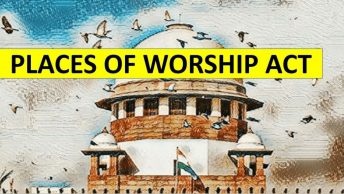Introduction
The case of Sameena Begum v. Union of India primarily questions the constitutionality of the practices of nikah halala and polygamy, which are constituents of the Muslim personal law. Other petitions which raised similar demands, such as those of the Muslim Resistance Women’s Committee and Ashwini Kumar Upadhyaya, have also been heard alongside. Three broad claims are made by the petitioners. The first plea is that Section 2 of the Muslim Personal Law (Shariat) Application Act, 1937 (“Shariat Act”), be declared unconstitutional by the court, to the extent that it validates the practices of nikah halala and polygamy. The second plea is for the criminalization of the aforementioned practices, along with the practice of talaq-e-biddat. Lastly, a demand for the introduction of the Uniform Civil Code (“UCC”) has also been made by the petitioners.
What are the practices that are being challenged?
Talaq-e-biddat, more commonly known as instantaneous triple talaq, is a practice whereby the pronouncement of the word ‘talaq’ thrice, by a man to his wife, results in instantaneous and irrevocable divorce. This practice was declared unconstitutional in India through the landmark judgement of Shayara Bano v. Union of India (“Shayara Bano”) and was further criminalised by the Muslim Women (Protection of Rights on Marriage) Act, 2019.
Nikah halala is related to the practice of triple talaq. Once a divorce has occurred through triple talaq, the former husband and wife cannot remarry, unless the wife consummates a second marriage, and the husband from this second marriage either divorces her or dies. There are broadly two types of triple talaq practices, talaq-e-hasan and talaq-e-biddat. While the latter is an instantaneous mode of divorce, the former requires a waiting period of one month before each pronouncement of ‘talaq’. Since the latter mode of divorce has been outlawed, nikah halala is currently practiced only in cases of talaq-e-hasan.
Polygamy is the practice whereby a person has multiple spouses at the same time. In the context of Muslim personal laws in India, it generally refers to the act of a Muslim man having up to four wives.
First Plea: Declare a part of Section 2 of the Shariat Act as unconstitutional
With regards to the first plea, the petitioners seek to have Section 2 of the Shariat Act declared unconstitutional, to the extent that it validates nikah halala and polygamy. It must be noted that in the case of State of Bombay v. Narasu Appa Mali, the court held that personal laws do not come within the ambit of ‘laws in force’, and hence cannot be subjected to judicial review in accordance with Article 13 of the Constitution. However, in the Shayara Bano case, the court held that a differentiation must be made between the ‘Sharia law’ as the personal law, and the ‘Shariat Act’ as a legislation made by the Parliament. Consequently, the petitioners do not seek to declare the Sharia law as unconstitutional, but rather to declare a section of the Shariat Act, a legislation, as unconstitutional.
The petitioners plead that the acts of polygamy and nikah halala violate their fundamental right to equality, right to freedom from discrimination on grounds of religion, and right to life and dignity, enshrined under Articles 14, 15 and 21 of the Indian Constitution respectively. Moreover, they present a two-fold argument on why these practices are not protected under right to freedom of religion, enshrined under Article 25 of the Constitution. Firstly, these practices are against ‘public order, health and morality’, and hence a valid exception to Article 25. It must be noted that morality in this context refers to ‘constitutional morality’ and not public morality, as was reiterated by the court in the Shayara Bano judgment. Secondly, the petitioners contended that any law that deals with marriage and divorce is inherently non-religious in nature, and hence cannot be claimed as an ‘essential religious practice’.
Second Plea: Criminalize talaq-e-biddat, nikah halala and polygamy
The second broad plea by the petitioners is to criminalize the practices of talaq-e-biddat, nikah halala and polygamy. Since talaq-e-biddat has already been criminalized by the legislature through the Muslim Women (Protection of Rights on Marriage) Act, 2019, the pleadings would focus on the criminalization of the remaining two practices. It is pertinent to note that it is beyond the powers of the court to create a separate criminal offence. The same was reiterated by the court in Divisional Manager, Aravali Golf Club v. Chander Hass, where it was stated that, “If there is a law, the judges can certainly enforce it, but judges cannot create a law and seek to enforce it”. The power of creating criminal offences rests solely with the Parliament and the state legislatures, as it falls within the Concurrent List of the Seventh Schedule. Having said that, through the wide interpretation of pre-existing criminal offences, the judiciary can include a certain act within the ambit of such an offence. Hence, the petitioners seek to include nikah-halala within the wider ambit of rape under Section 375 of the Indian Penal Code, 1860 (“IPC”). Moreover, they plead that the provisions of IPC should be equally applicable to all citizens, and hence polygamy should be criminalized for all, as per Section 494 of IPC.
Third Plea: Introduction of Uniform Civil Code
The last contention is for the court to direct the Law Commission of India to publish a report recommending the introduction of the UCC in line with Article 44 of the Constitution. India currently has a single criminal code governing all individuals. However, in matters of a civil nature, an array of personal laws exist, each being applicable to only a certain section of people, primarily in accordance with their religion. The UCC would essentially provide for a single civil code for the entirety of the Indian population, irrespective of their religion, and hence in essence do away with the various personal laws that are currently in practice. The UCC finds a mention in Article 44 of the Constitution, which lays down the directive principles of state policy.
The Supreme Court in its various judgments, such as Mohd. Ahmed Khan v. Shah Bano Begum and Sarla Mudgal v. Union of India, has encouraged the creation of UCC on the grounds of promotion of gender equality, uniformity in laws, etc. However, it must also be noted that Chief Justice D.Y. Chandrachud has recently stated that UCC is a matter over which the Parliament alone has jurisdiction, and that the court cannot direct the Parliament as to which laws must be enacted. Moreover, the Law Commission, in 2018, had released a report where it explicated upon the unfeasibility and undesirability of UCC in the current socio-political environment of the country. Instead, it recommended that uniformity in personal laws should be brought about by amending them in a ‘piece-meal fashion’. There is much controversy surrounding the desirability of UCC and a constant debate about how to harmoniously balance the right to equality with right to religion.
Status of the petition
The petition was last heard in the Supreme Court on August 30, 2022, and it is currently unclear as to when it might be further heard. However, it can be firmly stated that the decision taken by the court in this case would have far-reaching ramifications, and would deeply impact the future course of application of personal laws in India.
Aditi Bhojnagarwala is a first-year student at NALSAR University of Law, Hyderabad. This explainer has been written as part of LAOT’s Legal Writing Mentorship Program, 2023.
[Ed Note: This article has been edited by Sukrut Khandekar, coordinated by Shravani Shendye, and published by Suhani Paruvelly from our Student Editorial Team]








Why is there no status update on this case? Either the coirt should dismiss it or move it ahead…cNt keep it hanging.